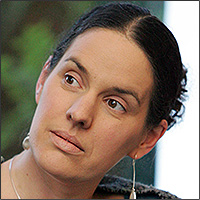Dr. Helen Phelan
// AuthorDR. HELEN PHELAN is an author and Course Director of the MA Ritual Chant and Song at the Irish World Academy of Music and Dance, University of Limerick, Ireland. Her book “Anáil Dé: The Breath Of God: Music, Ritual, And Spirituality” (2001) is available from Veritas Publications. She has also designed a four-part radio documentary based on the book. She is the Director of the Sanctuary initiative that coordinates Higher Education Authority funding for work with the ritual music of asylum seekers and refugees in Ireland. Dr. Helen Phelan is also Director and Founder of the Anáil Dé: Breath of God Festival of Sacred World Music.
Website: www.irishworldacademy.ie
Photo: Irish World Academy of Music and Dance, University of Limerick, Ireland
Interview:
When I first received an invitation to share my thoughts on music and spirituality, I was in the throes of a busy semester and asked if I could wait a few weeks before replying. As weeks turned to months and I kept looking at the e-mail sitting in my inbox, it began to dawn on me that I was procrastinating because I wasn’t sure that I believed there was an intrinsic connection between music and spirituality. How could this be? As someone, deeply immersed in the study and practice of ritual chant and song, I have witnessed – and experienced – the ways in which ritual music can lift us up, transform us, reinforce, and confirm the existential possibilities of all creation. As a ritual scholar and musician, I am constantly writing about, teaching and promoting the value of music and ritual in our lives. So what was holding me back?
It has something to do with a subtle, but I think, important shift in my own perception of music and spirituality. There was a time when I believed in the absolute value and importance of these forms of expression. Now, I am less inclined to believe in their intrinsic value and more inclined to believe in their power. I have no doubt about the potential power of music and spirituality in our lives. But power is a double-edged sword. It is difficult to be alive at the dawn of the 21st century and not be aware of ways in which religion, spirituality, and belief have become weapons of mass destruction. Music can also be appropriated for the darkest of deeds. Daniel Barenboim writes about a woman who approached him in Tel Aviv while the debate about his decision to perform Wagner was raging, and asked him how he could play such music when she saw her family taken to the gas chambers to the accompaniment of the overture from the Meistersinger.
So no, I don’t think music is essentially spiritual or transcendent or “good”, any more than “religion” or “spirituality” is. But they are powerful, and therein lies their potential for healing, transcendence, and enrichment in our lives. For the power of music and spirituality lies in their ability to communicate with those parts of our being which are deeper and wider than our rational, cognitive, mind-centred view of the world can even begin to imagine or articulate. The ephemeral, non-discursive movement of music from silence to silence, is the ideal medium for the expression of the inexpressible, the incomprehensible – the infinitely important. When the power of music can be directed towards this experience, it is hard to imagine a more spiritual way of being. Musical expression is also intensely primal. The first music we hear is the music of our mothers’ bodies while in the womb. The ability to sing is an evolutionary side effect of the mechanism of breathing, central to our survival.
Listening, hearing, sounding, and singing are hard-wired into our earliest experiences of being. In Celtic spirituality, neart is creative energy, which goes out from God and imbues all of creation. It is ever present and ever changing. The creative impulse – which is central to all music-making – is at the heart of neart, as our impulse towards creativity is seen to echo God’s great creation of the world. Creative performance is experienced as a way of emulating and celebrating the wonder and mystery of our existence. For me, this is encapsulated by the Irish poet John F. Deane, where he writes in his poem “Canticle”, of those rare moments when we are so present to our existence and our place in the wider cosmos that, “all the noise of the universe stills to an oboe hum, the given note of a perfect music”.
“Listening, hearing, sounding, and singing are hard-wired into our earliest experiences of being.”
– Dr. Helen Phelan, author of “Anáil Dé: The Breath Of God: Music, Ritual, And Spirituality”


